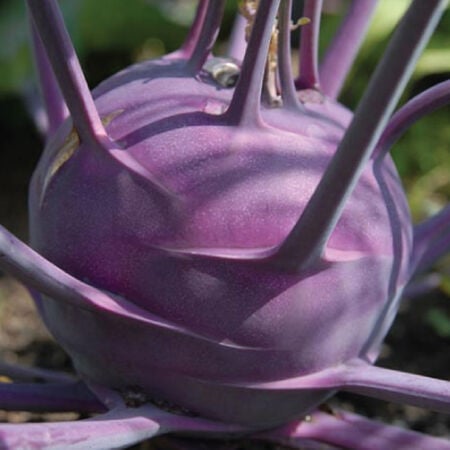Purple Vienna, Kohlrabi Seeds
Key Attributes
Key Attributes
Product Details
Weight
0.01Depth
0.1Height
4.5Width
3.25Plant Height
12-20"Botanical Name
Brassica oleracea var. gongylodesSeed Type
SeedAdditional Characteristics
Cool Season VegetablesSeeds Per Gram
303Seeds Per Pound
137,600Row Spacing
18"Packet
1,000 SeedsSow Depth
1/8"Seeds Per Ounce
8,600Breed
Open-pollinatedSun
Full SunLife Cycle
AnnualSow Method
TransplantPlant Spacing
4"Categories
KohlrabiGermination
14,15,16,17,18,19,20,21Days To Maturity (# Days)
55Heirloom
HeirloomSeeds Per Acre
3.2 lbsComponents
Growing Instructions
Shipping Schedule
Our Seed Promise
 "Agriculture and seeds" provide the basis upon which our lives depend. We must protect this foundation as a safe and genetically stable source for future generations. For the benefit of all farmers, gardeners and consumers who want an alternative, we pledge that we do not knowingly buy or sell genetically engineered seeds or plants.
"Agriculture and seeds" provide the basis upon which our lives depend. We must protect this foundation as a safe and genetically stable source for future generations. For the benefit of all farmers, gardeners and consumers who want an alternative, we pledge that we do not knowingly buy or sell genetically engineered seeds or plants.
The mechanical transfer of genetic material outside of natural reproductive methods and between genera, families or kingdoms, poses great biological risks as well as economic, political, and cultural threats. We feel that genetically engineered varieties have been insufficiently tested prior to public release. More research and testing is necessary to further assess the potential risks of genetically engineered seeds. Further, we wish to support agricultural progress that leads to healthier soils, to genetically diverse agricultural ecosystems, and ultimately to healthy people and communities.
To learn more about the "Safe Seed Pledge" please visit www.councilforresponsiblegenetics.org.

